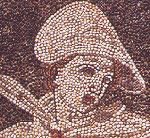So I just started reading Book II of the Pullman trilogy His Dark Materials, which begins with The Golden Compass. Right away, I stumble over what is one of Pullman's biggest faults. For me personally, it's a huge problem. It's enough to make me fall completely out of his stories, especially when it happens during an important plot scene, which it does often enough in a Pullman tale. (In fact, you could say that the entire plot of the first novel was predicated on this error.)
Basically, Pullman ignores his characters. He creates characters and writes about them from a distance, as if he were merely reciting the text of some play rather than being an actual actor who dons the makeup, dress, and physical demeanor and then speaks and acts as if he were the character.
Here's an example of what I mean: The story begins with a boy searching an old abandoned house from top to bottom for some special notebook that contains a raft of mysterious letters, which, once he finds it, will reveal tons of answers to questions that have dogged the boy for many years. I mean really HUGE questions, like, "Who is/was my father? Why was he so special? What happened to him? Why are my mother and I being chased by dangerous, bad people? Who are they?" And so on. So he finds the tablet and gets away from the bad guys, then by some miracle he ends up in a mysterious paradise where he has literally tons of time to do nothing.
We all know what he will do next, right? He'll do what any other boy, man, girl, woman, or space alien would do. He'll tear open the tablet and read the contents voraciously.
Wrong. He never opens the tablet.
Yes, he's dying to find out what's inside. Yes, he has waited his whole life to find out these answers. But he DOESN'T OPEN THE TABLET! Instead, he meets a mysterious girl and they talk. Then they eat dinner. Then they make plans to go on a trip. Then he says that he really wants to know what's inside the tablet, gee whiz, but instead he'll LEAVE IT BEHIND! It's safe here, he says, so he'll just read it when he comes back. Off they go, tra-la-la!
At this point I say something like "J. F. C.!" I drop the book on the table, and I swear I won't finish it. (I probably will.)
Note to self: If a character "wants" to do something, either let him do it and then find a way to make the plot work around it, or change the precipitating events so that the character no longer has any real knowledge of or opportunity to do that thing, or change the character entirely. But never, NEVER, force a character to do something stupid and obnoxious just because it's expedient for the plot.
Thursday, December 20, 2007
Tuesday, December 18, 2007
Cheers to Pullman of The Golden Compass Fame
My respect for Philip Pullman, author of The Golden Compass, inched up a bit after reading an interview in which he addresses the controversy surrounding the film.
Congratulations, Mr. Pullman, for having a spine.
On a separate but related note, I did enjoy reading The Golden Compass, more or less. I liked the swift and steady beat of the story, although I felt like it suffered from being a bit too swift in places. I'm told by a writer friend of mine that such a fast pace might be appropriate for a young audience. Could be.
Here's a funny coincidence: I walked out of the bookstore with two books in my hands, Milton's Paradise Lost and Pullman's The Golden Compass. I headed straight to a nearby coffee shop and set about trying to decide which of the two I would read first. Imagine my surprise when I read in the introduction to The Golden Compass that it happens to be Pullman's answer to Paradise Lost. Fate must have guided my hands. (Just kidding.)
"So he won't argue back?" [the interviewer asks.] [Pullman answers,] "It's a foolish thing for the teller of a story to answer critics. If you're putting forward an argument, you can argue back and demonstrate why your argument is better than theirs. But if someone doesn't like a story you've written, what are you going to say? 'Well, you should'?"How incredibly rare is that?! For once an author doesn't say the usual: "I apologize for any offense I might have caused. I respect everyone's point of view, and I'm not trying to say that my ideas are better than anyone elses." Blah, blah, blah.
Congratulations, Mr. Pullman, for having a spine.
On a separate but related note, I did enjoy reading The Golden Compass, more or less. I liked the swift and steady beat of the story, although I felt like it suffered from being a bit too swift in places. I'm told by a writer friend of mine that such a fast pace might be appropriate for a young audience. Could be.
Here's a funny coincidence: I walked out of the bookstore with two books in my hands, Milton's Paradise Lost and Pullman's The Golden Compass. I headed straight to a nearby coffee shop and set about trying to decide which of the two I would read first. Imagine my surprise when I read in the introduction to The Golden Compass that it happens to be Pullman's answer to Paradise Lost. Fate must have guided my hands. (Just kidding.)
Subscribe to:
Comments (Atom)


